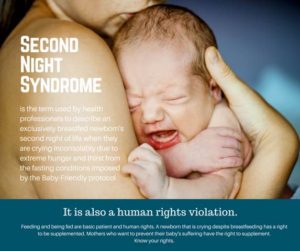I gave birth to my daughter three months ago (vaginal delivery) after prolonged labour. I had been ill the week before, unable to walk, stand, or sleep (I had been to the emergency room several times for pain in my left iliac fossa; they ordered exams, but no diagnosis came up), so I was already exhausted prior to birth. I chose a baby-friendly hospital (two hours of skin-to-skin contact after delivery, no nursery, no doctors unless strictly necessary) because I wanted, if all the clinical criteria were fine, a less medicalized experience with a midwife.
My second night was awful, as my baby cried desperately and was attached to my breasts all night long. I even called the midwives because I was so tired, but they reassured me saying that everything was going just fine, so I just endured for the good of my daughter. To be honest, I was already skeptical by my prenatal course teachers with their motto ”breastfeeding is the best for babies’ and mothers’ health.” As a doctor, I knew that formula works just fine in western countries for term infants with almost no repercussions on the child; but I felt so overwhelmed after delivery that I needed to trust the professionals—I needed not to be my daughter’s doctor.

My daughter lost 7 % of her body weight and was anuric (no wet diapers), so the pediatrician gave us some formula to supplement because she was hungry and to prevent complications.
We were discharged with supplementation by the doctors, but the lactation consultants of the hospital didn’t agree with their advice. They warned me that I would lose the chance of breastfeeding my child by following the doctors’ recommendations despite my baby being desperately hungry.
It took six days for my milk to come in. I try not to think about what would have happened to my baby if I listened to the IBCLCs advice.
I did manage to breastfeed for a month and a half. My baby grew, but then something went wrong. I had never fully recovered from giving birth; I felt exhausted all the time, and my baby started to get hungry after breastfeeding. She bit her hands, cried, and searched for my breast desperately again. Each time it took 40-50 minutes to breastfeed her, and at the end, she fell asleep from exhaustion but not satisfied as the first weeks. In fact, after 20-30 minutes she was crying again.
The lactation consultant assured me that my baby was in a growth spurt and that I had to be patient even if our frequency of feeding reached 18 times per day.
She said my supply would adapt in a few days. So I breastfed all the time, night and day, but nothing changed except my state of mind. I was scared every time my daughter started crying. I felt very sad, I felt guilty about not eating or drinking as much as I should have, and I felt like a bad mother since I just couldn’t go on this way. All of a sudden one day my daughter stopped crying, and that night she didn’t wake up. I finally found the lucidity of trusting my convictions and started supplementing. I went to my pediatrician immediately and discovered she had dropped to 3rd percentile on her growth chart. She was starving!
I had the full support of my pediatrician to breastfeed and then immediately supplement my daughter so that she could begin thriving.
However, the lactation consultants continued to state that every mother has the ‘correct amount of milk’ for her child if she follows the rules to breastfeed properly, and no infant ever died of starvation due to insufficient milk.
These statements are so ridiculous and false, and it’s ethically wrong to say this to a patient. As we all know, every organ in our body can have some malfunction; mammary glandular tissue is no exception.
In Italy, we are not fully cognizant of the whole philosophy behind BFHI, but as I can see from talking to other mums, they remember being very tired and some of them were alone and felt treated badly. There is a sort of war between midwives and pediatricians about how to safely breastfeed. As a doctor whose specialty is brain injury and rehabilitation, aren’t doctors afraid of legal issues due to starving a child using the BFHI protocol? They are legally responsible…
This is the first study about breastfeeding complications and readmission that I know of and the results are very concerning. This research paper confirms how desperately your educational resources are needed in my country.
In a study of 1065 mothers, 532 or 50% had breastfeeding-related problems. Thirty-one percent affected the mother (e.g engorgement, fissures, low milk supply, infections, breastfeeding cessation), and 10% affected the newborn (poor suction, neonatal jaundice, pathological weight loss, need for admission. Nine percent affected both the mother and the newborn (Govonni, Richi, 2019). Among the identified risk factors for breastfeeding problems, operative vaginal deliveries and cesarean delivery had the highest associated risk for breastfeeding problems. Other factors like higher maternal age, number of previous deliveries, and lower Apgar scores also increased risk of DOLII.
Please learn how to safely breastfeed your babies!
Dr. Mara P.
If I Had Given Him Just One Bottle, He Would Still Be Alive.
Knowing if Your Newborn is HUNGRY and Needs Urgent Evaluation / Supplementation
Know Your Risks for Delayed Onset of Full Breast Milk Supply
HOW YOU CAN SUPPORT FED IS BEST
There are many ways you can support the mission of the Fed is Best Foundation. Please consider contributing in the following ways:
-
- Join us in any of the Fed is Best volunteer and advocacy, groups. We currently have– Health Care Professionals Group, Advocacy Group, Research Group, Volunteer Group, Editing Group, Social Media Group, Legal Group, Marketing Group, Maternal Mental Health Advocacy Group, Private Infant Feeding Support Group, Global Advocacy Group, and Fundraising Group. Please send an email to Jody@fedisbest.org– if you are interested in joining any of our volunteer groups.
- If you need support, we have a private support group– Join us here.
- If you or your baby were harmed from complications of insufficient breastfeeding please send a message to contact@fedisbest.org
- Make a donation to the Fed is Best Foundation. We are using funds from donations to cover the cost of our website, our social media ads, our printing and mailing costs to reach health providers and hospitals. We do not accept donations from breast- or formula-feeding companies and 100% of your donations go toward these operational costs. All the work of the Foundation is achieved via the pro bono and volunteer work of its supporters.
- Shop at Amazon Smile and Amazon donates to Fed Is Best Foundation.
- Sign our petition! Help us reach our policymakers, and drive change at a global level. Help us stand up for the lives of millions of infants who deserve a fighting chance. Sign the Fed is Best Petition at Change.org today, and share it with others.
- Share the stories and the message of the Fed is Best Foundation through word-of-mouth, by posting on your social media page and by sending our FREE infant feeding educational resources to expectant moms that you know. Share the Fed is Best campaign letter with everyone you know.
- Write a letter to your health providers and hospitals about the Fed is Best Foundation. Write to them about feeding complications your child may have experienced.
- Print out our letter to obstetric providers and mail them to your local obstetricians, midwives, family practitioners who provide obstetric care and hospitals.
- Write your local elected officials about what is happening to newborn babies in hospitals and ask for the legal protection of newborn babies from underfeeding and of mother’s rights to honest informed consent on the risks of insufficient feeding of breastfed babies.
- Send us your stories. Share with us your successes, your struggles and everything in between. Every story saves another child from experiencing the same and teaches another mom how to safely feed her baby. Every voice contributes to change.
- Send us messages of support. We work every single day to make infant feeding safe and supportive of every mother and child. Your messages of support keep us all going.
Or simply send us a message to find out how you can help make a difference with new ideas!
For any urgent messages or questions about infant feeding, please do not leave a message on this page as it will not get to us immediately. Instead, please email christie@fedisbest.org.
Thank you and we look forward to hearing from you!

One thought on “Italian Doctor Talks About Her Daughter Starving In A Baby-Friendly Hospital And Clinic Under The Care Of IBCLCs”